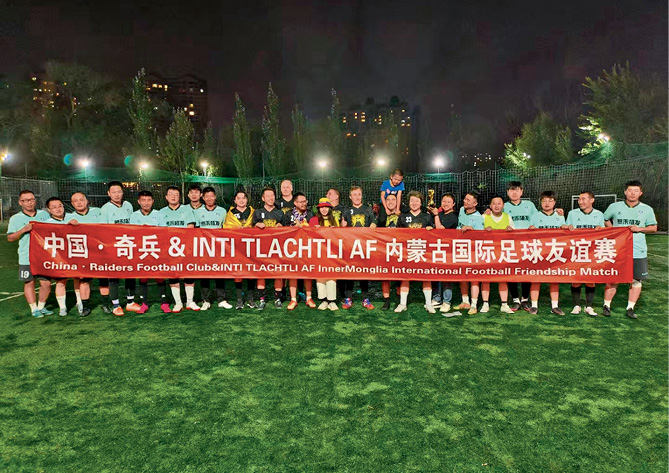China will unswervingly follow the path it has chosen and the direction it has set – and I look forward to continuing to experience this as an observer and participant.
The People’s Republic of China (PRC), founded in 1949, is still quite young at 75 years old. Within this short period of time China has not only been transformed from an underdeveloped agricultural state into a leading economic power and become the number one global driving force, it has also lifted hundreds of millions of people out of poverty, providing modest prosperity for all in a historically short period of time. Many Chinese today drive expensive German cars and own condominiums or apartments, and the number of billionaires in China is in the high three-digit range.
This year I am also celebrating a small anniversary of my own: I have spent a total of 7.5 years in China. When I was growing up in Germany, my parents had a passion for traveling and took my brother and me on at least three long trips every year. As a result, I continue this family tradition and travel whenever possible. After my first visit to China with my parents as a child in the 1980s, throughout my traveling to other countries around the world, I never forgot China. I always wanted to visit this mysterious country in the Far East again.
According to a Chinese proverb, “Nothing is impossible to a willing mind.” My dream finally came true in 2017. But this time I came to China not as a tourist, but as an employee. Everything seemed to fall into place quite naturally, as if I had simply moved my workplace from Berlin to Hamburg, but I found China to be more exciting.
Even though the initial veil of China’s mystery slowly rises the longer I live here, my initial curiosity and enthusiasm has remained alive to this day. After coming to China, I first worked as a German editor for the China Media Group and then as a lecturer for the University of International Business and Economics in Beijing. Since the first time I stepped onto this magical land in 1985, my relationship with China has spanned nearly 40 years.

A dance troupe in Aksu Prefecture, Xinjiang Uyghur Autonomous Region, rehearses in December 2020.
Big Changes on the Table
When I first visited China with my parents and brother, the country was still in the early stage of the reform and opening up. At that time, China was still a long way from the modern country we know today. The streetscape was dominated by bicycles, and the standard of living was modest compared to that of Western countries. However, people’s curiosity and determination to bring about change were already palpable. Speaking of curiosity, back in 1985, there were far fewer foreigners and people’s interest in my blond-haired two-meter-tall father, who had to bend his head down in the hotel rooms, and my family was correspondingly strong. Smartphones did not yet exist and so being photographed was limited.
Since food is a paramount necessity for people, it serves as an important entry point to understand the temperament, culture, and economic development of a nation. Chinese people’s unique eating habits greatly impressed me during my first visit. I was also surprised by all the noises that filled restaurants — everyone talked loudly. In addition, people really yelled for waiters to come to their table. Only decades later did I come to understand that “fuwuyuan” is not a swear word, but rather the Chinese term for waiter or waitress. During my first visit I had no idea.
At that time, we hoped in vain on many occasions to find cold water to drink. The reason we could not find it was because Chinese at that time generally preferred to drink warm or even hot water. Today, some waiters take the initiative when they see foreigners to ask them what kind of water they would like. On hot days, many restaurants even offer free water carafes with cool water and lemon slices.
I read somewhere that eating with chopsticks is not considered the easiest method of taking food even by many Chinese, but the reason they stick to it is because they believe learning something complicated early in life better prepares children to face a strenuous life. In fact, Chinese people prefer activities which exercise their children’s abilities. Today, after much practice, I can eat peanuts quickly with chopsticks, a practice that is much better than stuffing them into my mouth with my hand.
In Germany, if someone puts a piece of fish in their mouth and a little later spits out all the bones sparkling clean into a napkin, it is enough for them to appear on television. But this is nothing unusual in China. Here, the mouth still serves as a universal eating tool with which meat and everything edible is separated from bones, no matter how tiny. In Germany, this is all done by machines creating the product which is called mechanically separated meat.
China is a big country in catering culture and has formed an array of its own distinctive local flavors with cooking styles that include Sichuan cuisine, Hunan cuisine, Shandong cuisine, Zhejiang cuisine, Fujian cuisine, Anhui cuisine, Cantonese cuisine, and Jiangsu cuisine. It also has a profound tea culture. With the opening of China's doors to the outside world, foreign fast food began to enter the Chinese market. KFC opened its first store in Beijing in November 1987, and McDonald's began its triumphal march in Shenzhen in October 1990. During the 1990s, it was considered modern, distinguished, and even dignified to invite a friend to eat at McDonald’s or KFC. But now, at least in the eyes of the Chinese middle class, it is just a place where you occasionally take your children to eat. The golden age of Western fast food has been over for quite a while, and now Chinese prefer eating Chinese fast food.
At first, I thought that the Chinese would become as overweight as we Germans in view of the invasion of Western fast-food chain restaurants and high-calorie food trends. But despite the large intake of ice cream, milk teas, cappuccinos, burgers, and pizzas, the Chinese by and large are still a slim and fit people, who are mindful of gaining too much weight. When taking an elevator, foreigners should never go by the maximum number of people who can ride the elevator, but go only by the permissible total weight because a Westerner often weighs as much as two Chinese.

The colorful Danxia landform of Zhangye Global Geopark in Gansu Province. Photos by Nils Bergemann
From Laggards to Leaders
When the PRC was founded on October 1, 1949 under the leadership of Mao Zedong, my mother had not yet been born and no one could have imagined that her son would work there one day. The country, which had previously been badly shaken by droughts, floods, earthquakes, famines, and decades of wars and internal conflicts, was economically exhausted. At that time, everything was waiting to be rebuilt, but the resilient Chinese never gave up.
During the early years of the PRC, China's agriculture recovered and developed rapidly, and the national crisis prevention and response mechanism continued to improve. In 1978, Deng Xiaoping's reform and opening-up policy set the direction for China's economic development.
In the 1990s, China emerged as the world factory as it massively expanded its manufacturing capacity and began to play a central role in global supply chains, but that was only the beginning.
Over the past 20 years, China has evolved from a manufacturing base to a center for innovation and technology. Today, China is a leader in areas such as artificial intelligence, high-speed trains, supercomputers, and aerospace. During my travels around China, I have always been impressed by how far technological development has spread. High-speed trains, which very often cross the country at speeds of 350 km/h or more, are a daily reality. In terms of airport construction, China is far ahead, while Germany ranks the lowest. China has countless Internet companies, but Germans will be happy if they have fast Internet at all.
In the electric vehicle industry, China has even overtaken what once was termed the carmaker nation — Germany. Chinese electric vehicle manufacturers such as BYD and NIO are playing an increasingly important role in the global market. While I still see people with paper train tickets in Germany, the digital world is omnipresent all over China. The ubiquitous use of apps like WeChat and Alipay have profoundly changed people's everyday lives. I remember how I regularly rented a shared bike via a QR code and rode through the streets way before such convenience existed in Europe.
In addition to economic and technological progress, China's international role has also changed considerably. Today, China is a central player on the world stage, not only economically, but also politically. The Belt and Road Initiative proposed by President Xi Jinping in 2013 has been well received by the international community. The vision of building a community with a shared future for humankind embodies the broad consensus of the international community.
In Berlin, I became acquainted with a lot of Chinese through a Chinese-French couple. We often met to drink coffee together, cook Chinese food, and chat about life. They were full of pride about the advancement of their home country. The conversations we had about China's progress were often very passionate. Our discussion revolved around China’s determined fight against corruption, promotion of e-commerce, economic and technological growth, and the rise of Chinese brands like Huawei. They saw China as a nation that had found its role in the world and is shouldering its responsibility. At the same time, while Chinese are proud of their country’s accomplishments, they do not look down at less successful nations.
In addition to transforming China's economy, the reform and opening-up policy has also brought about profound social and cultural changes. This far-sighted policy has not led to a sharp decline in the number of middle-income groups, as in developed countries, but rather increased it dramatically.
Today, I have the privilege of teaching at a prestigious university in Beijing and am always deeply impressed by the curiosity, ambition, and social responsibility of my students. Millions of young Chinese are well educated and will carry the country's innovative strength into the future.
Despite China’s enormous economic progress, it still faces challenges today. One of the biggest challenges is environmental protection. In recent years, China has made serious efforts to address environmental problems such as air pollution and biodiversity loss, but much remains to be done. The government has made the issue of environmental protection a top priority. By the way, the air in Beijing has become better over the last few years.

The author’s team wins a friendly football match held in Hohhot, Inner Mongolia Autonomous Region, in September 2023.
Looking Ahead
What does the future hold for China? It is likely that the country will continue to expand its international role. China does not want the strongest country in the world to determine others' security and rights. In a multi-polarized world, everyone should be entitled to these basic rights. Building a community with a shared future for humankind is the key to China's success. In addition, China's abundance of highly qualified talents and the government's unsparing investment in education have made it a world leader in many key areas.
Despite whatever challenges China faces in the future, I am optimistic that it will continue implementing its reforms and continue to develop. China has proven over the past 75 years that it is capable of learning from mistakes. China’s self-correction mechanism is legendary, and instead of just adapting to circumstances, it finds its own path and shows others the way.
The coming decades will show how far China can go with its innovations and initiatives, but one thing is certain: This century belongs to China.
When I first traveled to China back in the 1980s, I never dreamed that I would one day witness the remarkable story of its development. Today, after being in China for 7.5 years, I see a nation that has found its identity and is determined to shape its future. China will unswervingly follow the path it has chosen and the direction it has set – and I look forward to continuing to experience this as an observer and participant. 
NILS BERGEMANN is a German scholar and freelance journalist.